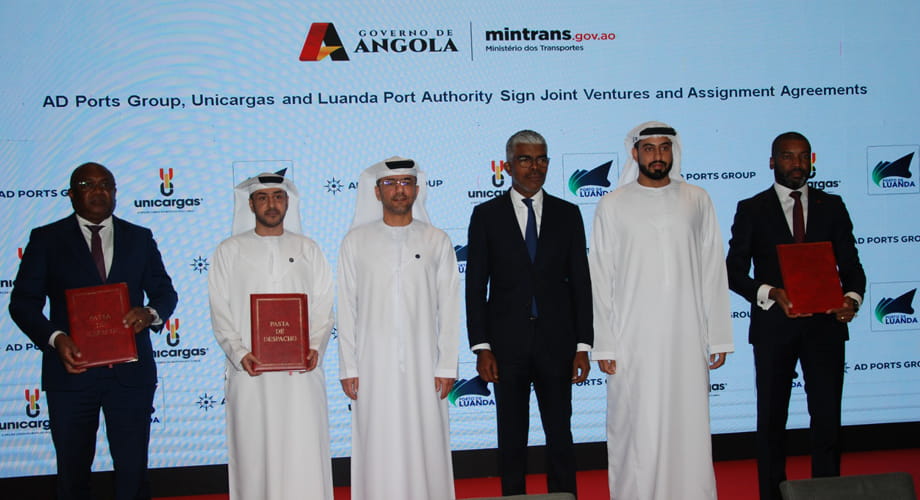AD Ports Group (ADX: ADPORTS), a leading facilitator of global trade, logistics, and industry, has signed several agreements with Unicargas and Multiparques leading to securing a 20-year concession agreement (extendable for another 10 years) with the Luanda Port Authority for the operation and upgrade of the existing Luanda multipurpose port terminal in Angola.

The agreements with Unicargas and Multiparques, well-known logistics and transport companies in the country, saw the Group acquire an 81% stake in a joint venture that will operate the terminal, and a 90% stake in another joint venture that will serve the facility and the broader Angolan logistics market.
AD Ports Group has committed USD 251 million towards the modernisation of the terminal and development of the logistics business over the next three years (2024-2026), with this investment potentially increasing to USD 379 million over the concession term and in line with market demand.
Serving as Angola’s dominant maritime gateway along the corridor, the Port of Luanda plays an important role in Angola’s domestic economy by handling more than 76% of the country’s container and general cargo volumes. It is well situated to capture the anticipated growth in the country’s container volumes, which are projected to rise at an average annual rate of 3.3% over the next decade. In addition, it serves as one of the main transhipment hubs for Central-West Africa by enabling maritime trade access to land-locked countries, including the Democratic Republic of Congo and Zambia.
Ricardo Daniel Sandão Queirós Viegas de Abreu, Minister of Transport, Angola, said: “The Port of Luanda is not just Angola's main maritime gateway; it is a critical hub for regional trade and economic vitality. Through our strategic partnership with AD Ports Group, which is part of a broader effort involving multiple first-class stakeholders, we will transform the port into a modern, multi-faceted facility that will significantly enhance our logistic capacities and stimulate economic growth across Central-West Africa. This collaboration marks a significant milestone in our mission to modernise infrastructure and expand global trade access, promising a prosperous future for Angola and its partners."
Capt. Mohamed Juma Al Shamisi, Managing Director and Group CEO, AD Ports Group, said: “The milestone agreements we signed today with our Angolan partners, deliver on last year’s framework agreement signed between AD Ports Group and the Government of Angola in the presence of His Excellency Sheikh Shakhbout bin Nahyan Al Nahyan, Minister of State for Foreign Affairs. Supported by the vision of our wise leadership, the multipurpose terminal will be modernised to attract business from leading global shipping lines and offer the highest levels of service efficiency and quality, thereby benefitting our nations, partners, stakeholders and customers.”
Joaquim Nazaré Pimentel da Piedade, Unicargas Management Committee Coordinator, said: "At Unicargas, we view our partnership with AD Ports Group as a transformative opportunity to leverage global expertise and resources, to accelerate the modernisation and expansion of the Port of Luanda and logistics infrastructure. Together, we are committed to unlock new potentials, foster economic growth, and establish Angola as a key player in the global maritime trade landscape."
Mohamed Eidha Tannaf AlMenhali, Regional CEO – AD Ports Group, said: “We are pleased to see these landmark agreements come to fruition, as Angola is a very important partner for our Group. We look forward to working with Unicargas and Multiparques’ local management and on-ground teams to leverage our respective expertise and capacities to ensure a smooth transition and bring new opportunities for business growth and development.”
Under the terms of the terminal concession agreement, the joint venture will significantly upgrade the existing multipurpose facility to a container and Ro-Ro terminal, encompassing an enlarged concession area (178,000 sqm to 192,000 sqm); an upgraded quay wall; additional ship-to-shore cranes, gantry cranes and other state-of-the-art equipment; expanded draft (9.5 metres to 16 metres); and, modernised IT systems.
Redevelopment of the terminal is expected to be completed in Q3 2026, ultimately boosting its container handling volumes from 25,000 TEUs to 350,000 TEUs, and Ro-Ro volumes to over 40,000 vehicles. During the 3-year redevelopment, the terminal’s container volumes will be handled at a nearby berth, while excess volumes will be moved to Multiparques’ Viana inland container depot (ICD), thereby minimising any impact to customers.
Furthermore, the Group’s other joint venture with Unicargas will provide integrated logistics and freight forwarding services for local, regional and international clients. The business, to be operated by Noatum Logistics, part of AD Ports Group, will manage the movement of containers to Viana ICD and offer short and long-haul transport within Angola and to the neighbouring countries, leveraging Noatum’s broad global expertise, infrastructure and logistics networks combined with the knowledge, capacities and assets of the local Unicargas team.
Specifically, Noatum will assume management and operations of Unicargas’ existing fleet of trucks and different logistics sites located across the country. In addition, it will boost the business’ capacity by investing in new machinery, reefer and flat-bed trucks and upgrading its IT systems to plug in seamlessly across Noatum Logistics’ digital ecosystem - thereby providing for full end-to-end supply chain visibility and enhanced operational efficiency.
In addition, AD Ports Group is also exploring opportunities to support Angola’s offshore industry and other maritime sectors, through its Maritime & Shipping Cluster, and deploy assets such as work accommodation vessels, passenger ferries, platform supply vessels, and other maritime craft and infrastructure.
With a population of 34.5 million, growing at a rate of 3.2%, and a GDP of USD 74 billion, the Republic of Angola is considered the sixth largest economy in sub-Saharan Africa and a sizable domestic market also requiring meaningful gateway cargo volumes.